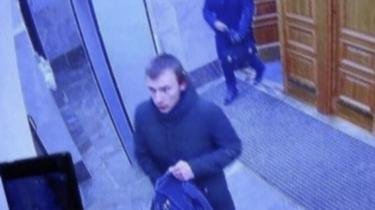
A 17-year-old has died of his wounds after detonating explosives in an office of Russia's FSB federal security service in the north-western city of Arkhangelsk, officials say.
Three FSB employees were hurt when the explosives went off just inside the building at around 09:00 (06:00 GMT).
The blast caused serious damage.
A CCTV image of the suspect emerged soon afterwards, along with a message he allegedly posted on social media just before the blast.
Although the authenticity of the message posted on an anarchist chat group has not been confirmed, the user identifies himself as an anarcho-communist and claims the FSB "fabricates cases and tortures people".
ADVERTISEMENT
College student who 'did not drink'
Russia's anti-terrorism committee said, according to initial findings, the suspect was a 17-year-old local resident who had gone into the building and pulled out of his bag an "unidentified object that exploded in his hands".
He was later named as Mikhail Zhlobitsky, a student at a local technical college. His grandmother told BBC Russian that she could not understand why he had blown himself up.
"He doesn't drink or smoke, and he doesn't swear. He doesn't play truant - he always attends college. I've no idea what happened," she said.
The blast was described as a terrorist attack. Governor Igor Orlov said local authorities in Arkhangelsk, around 1,200km (750 miles) north of Moscow, had taken measures to heighten security in all public buildings.
Map of Russia and Arkhangelsk
Attacks on security services are unusual in Russia, although police have been targeted in parts of the Caucasus, including Chechnya and Dagestan.
Novichok suspect traced to tiny Arkhangelsk village
Teenagers killed staging Chechen attacks
Britain's 'concentration camp' in Arkhangelsk
Crane damages Russia's aircraft carrier
The FSB has been behind two controversial cases this year, against groups accused of plotting violent uprisings, the BBC's Sarah Rainsford reports from Moscow.
In both, human rights groups argued the claims were false, while they said statements in one case were extracted under torture.
Hi! I am a robot. I just upvoted you! I found similar content that readers might be interested in:
https://www.bbc.co.uk/news/world-europe-46043424
Downvoting a post can decrease pending rewards and make it less visible. Common reasons:
Submit